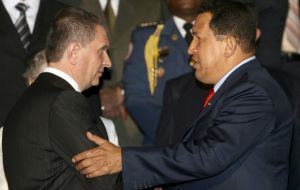MercoPress. South Atlantic News Agency
Venezuela and Russia strengthen links in mining and finance
 Pte. Chavez (R) greets Russia's Deputy PM Sechin during a meeting at Caracas last September
Pte. Chavez (R) greets Russia's Deputy PM Sechin during a meeting at Caracas last September Russia and Venezuela have signed 15 co-operative agreements in the financial, industrial, mining, aerospace, energy and communications, which include a joint venture with Russian aluminium giant RusAl building a production facility in Venezuela.
Novosti, the Russian News & Information Agency, reported that RusAl and its Venezuelan partner will split ownership of the joint venture. RusAl's Director for International and Special Projects, Alexander Livshits, said the joint venture's biggest problem was not financing, but power, which would be solved by building a new power plant. Venezuelan President Hugo Chavez said the two countries are establishing a strategic alliance. "We have freed ourselves from Yankee imperialism," he declared. Chavez and Russian Deputy Prime Minister Igor Sechin have set up a 4 billion US dollars joint development bank to finance gas production, aluminium production and other projects. The two inaugurated the first Venezuelan-Russian offshore natural gas project, which will be partially financed by Gazprombank, the banking division of Russia's Gazprom. Although Venezuela has South America's largest natural gas reserves, they are largely undeveloped because the country focused on oil for energy production. Gazprom has a contract to develop two Venezuelan natural gas properties and is expected to start producing gas by 2013. The two countries have also reached agreement on developing nuclear power generation for Venezuelan. The head of international relations at Russia's Finance Ministry, Konstantin Vyshkovsky, said the bank would finance projects in Russia and Venezuela, and could be involved in payments for oil deliveries. He told Novosti that the global financial turmoil means that it was a good time to create such a bank. Russian President Dmitry Medvedev is expected to visit Latinamerica later this month and is believed to be making Venezuela one of his stops. His visit will coincide with the arrival of a fleet of Russian warships that includes a nuclear-powered cruiser (Peter the Great) for manoeuvres in the Caribbean. It will be the first time Russian warships have sailed into the region since the end of the Cold War. Venezuela and Russia are also due to finalize new arms purchases including tanks and planes. Meanwhile confirming news reports, Venezuela announced it will seize two prime gold projects from North American junior mining companies and turn them into a joint venture with Rusoro Mining, which has financial ties to Russia. Venezuela will take over and nationalize Las Cristinas, the biggest gold mine in the country owned by Canada's Crystallex, said Mining Minister Rodolfo Sanz. "This mine will be seized and managed by a state administration" Sanz said in a statement. The Venezuelan government move comes ahead of elections for governors and mayors on November 23 in which Chavez faces tough competition. Las Cristinas mine, located in south-eastern Bolivar state is estimated to hold 16.9 million ounces of gold, in proven and potential reserves of the precious metal, according to Crystallex data. Since the start of the year, Venezuela has been withholding environmental permits that allow private companies to extract gold, in lieu of a law that will establish joint ventures with foreign companies with majority stakes by the Venezuelan state. Crystallex, whose main asset is Las Cristinas, said in a statement on its website that it "has not been notified of any changes ... regarding the Las Cristinas Project or the Mine Operating Contract". Venezuela's gold production would now rise from 4.2 to 8.2 tons annually from 2009, according to Sanz. This is a jump of more than 100% of production in only three months as a consequence of the rise in production capacity of plants that are now owned by the state, indicated Sanz.




Top Comments
Disclaimer & comment rulesCommenting for this story is now closed.
If you have a Facebook account, become a fan and comment on our Facebook Page!